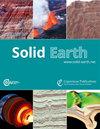Integration of automatic implicit geological modelling in deterministic geophysical inversion
IF 2.7
2区 地球科学
Q1 GEOCHEMISTRY & GEOPHYSICS
引用次数: 0
Abstract
Abstract. We propose and evaluate methods for the integration of automatic implicit geological modelling into the geophysical (potential field) inversion process. The objective is to enforce structural geological realism and to consider geological observations in a level set inversion, which inverts for the location of the boundaries between rock units. We propose two approaches. In the first approach, a geological correction term is applied at each iteration of the inversion to reduce geological inconsistencies. This is achieved by integrating an automatic implicit geological modelling scheme within the geophysical inversion process. In the second approach, we use automatic geological modelling to derive a dynamic prior model term at each iteration of the inversion to limit departures from geologically feasible outcomes. We introduce the main theoretical aspects of the inversion algorithm and perform the proof of concept using two synthetic studies. The analysis of the results using indicators measuring geophysical, petrophysical, and structural geological misfits demonstrates that our approach effectively steers the inversion towards geologically consistent models and reduces the risk of geologically unrealistic outcomes. Results suggest that the geological correction may be effectively applied to pre-existing geophysical models to increase their geological realism and that it can also be used to explore geophysically equivalent models.将自动隐含地质建模纳入确定性地球物理反演
摘要我们提出并评估了将自动隐含地质建模纳入地球物理(势场)反演过程的方法。目的是加强结构地质的真实性,并在水平集反演中考虑地质观测,反演岩石单元之间的边界位置。我们提出了两种方法。第一种方法是在反演的每次迭代中应用地质修正项,以减少地质不一致性。这是通过在地球物理反演过程中集成自动隐式地质建模方案来实现的。在第二种方法中,我们利用自动地质建模在反演的每次迭代中推导出动态先验模型项,以限制偏离地质可行结果的情况。我们介绍了反演算法的主要理论方面,并利用两项合成研究进行了概念验证。使用衡量地球物理、岩石物理和构造地质误差的指标对结果进行的分析表明,我们的方法能有效地引导反演向地质上一致的模型发展,并降低地质上不现实结果的风险。结果表明,地质校正可有效地应用于已有的地球物理模型,以提高其地质真实性,也可用于探索地球物理等效模型。
本文章由计算机程序翻译,如有差异,请以英文原文为准。
求助全文
约1分钟内获得全文
求助全文
来源期刊

Solid Earth
GEOCHEMISTRY & GEOPHYSICS-
CiteScore
6.90
自引率
8.80%
发文量
78
审稿时长
4.5 months
期刊介绍:
Solid Earth (SE) is a not-for-profit journal that publishes multidisciplinary research on the composition, structure, dynamics of the Earth from the surface to the deep interior at all spatial and temporal scales. The journal invites contributions encompassing observational, experimental, and theoretical investigations in the form of short communications, research articles, method articles, review articles, and discussion and commentaries on all aspects of the solid Earth (for details see manuscript types). Being interdisciplinary in scope, SE covers the following disciplines:
geochemistry, mineralogy, petrology, volcanology;
geodesy and gravity;
geodynamics: numerical and analogue modeling of geoprocesses;
geoelectrics and electromagnetics;
geomagnetism;
geomorphology, morphotectonics, and paleoseismology;
rock physics;
seismics and seismology;
critical zone science (Earth''s permeable near-surface layer);
stratigraphy, sedimentology, and palaeontology;
rock deformation, structural geology, and tectonics.
 求助内容:
求助内容: 应助结果提醒方式:
应助结果提醒方式:


